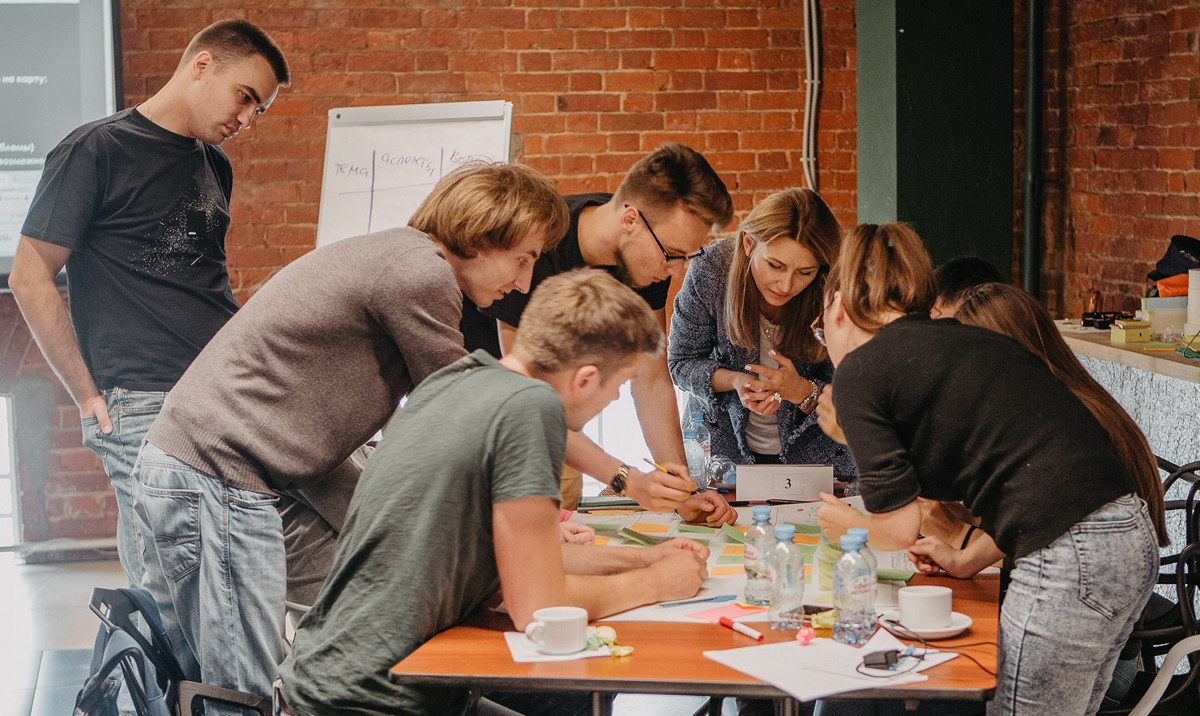
The areas of activity of the product manager are highly dependent on the company in which he works. Let's talk about what it means to be a product manager, what tasks he solves and how to develop in order to become a classy specialist in this field? We discussed these topics in detail at the first Summer Product School for young professionals from M. Video-Eldorado.
Part 1. Who is a product specialist?
Evgeny Abramzon, Head of Mobile Shopping Experience, M.Video-Eldorado Group.
Over the course of my career, I have communicated with many product managers, and I can distinguish three types of product experts, who are often stages of professional development:
- Product Secretary . It collects “Wishlist” and business expectations, systematizes and generalizes them, simultaneously choosing processes for prioritization. After that, he prioritizes, creates scoring models, committees.
- Product foreman . The most interesting kind of product specialist. He knows different methods of prioritization and project management, understands Agile philosophy and knows how to apply agile development methodologies. Unlike the product secretary, who collects information, prioritizes and communicates, the product supervisor has his own team with which he improves and develops the product.
- Product business . It is he who determines the strategy of the product, builds the development process, forms the requirements and appearance of the product. He forms a team and manages it. This category of product products is most often found in modern technology companies.
The constant desire for self-development and the desire to solve complex problems are necessary features for any product. As in any profession, it is perfectly normal to start work with gradual immersion.
You can start your journey with any of the three categories of products described, but from the position of a product secretary it is much easier to do.
Why are product managers at all so different?
There are many reasons.
Firstly, it depends on the degree of maturity of the company itself . For example, if before the company did not have its own digital products - websites, internal applications - then it didn’t need a product manager either. And when the company embarks on the path of digitalization, it hires a product manager. Of course, there is no experience yet, therefore, they do not hire an experienced specialist, but a product secretary.
The degree of maturity of a product also affects the choice of a product specialist of one type or another. For example, the company decided to call some modular system “product” and appointed a former business analyst who will act as a product secretary. Or the company is developing a mobile application and hired a strong product technologist who immediately worked out a development strategy, prescribed metrics, formed a team.
Another possible reason for the typical variety of product experts is the maturity of the specialists themselves . The strong can be given very broad powers to develop the product.
Product Responsibility
It "only" ensures the success of the product in the market. This is the only goal of the product specialist! He must spend all his time and effort to achieve it.
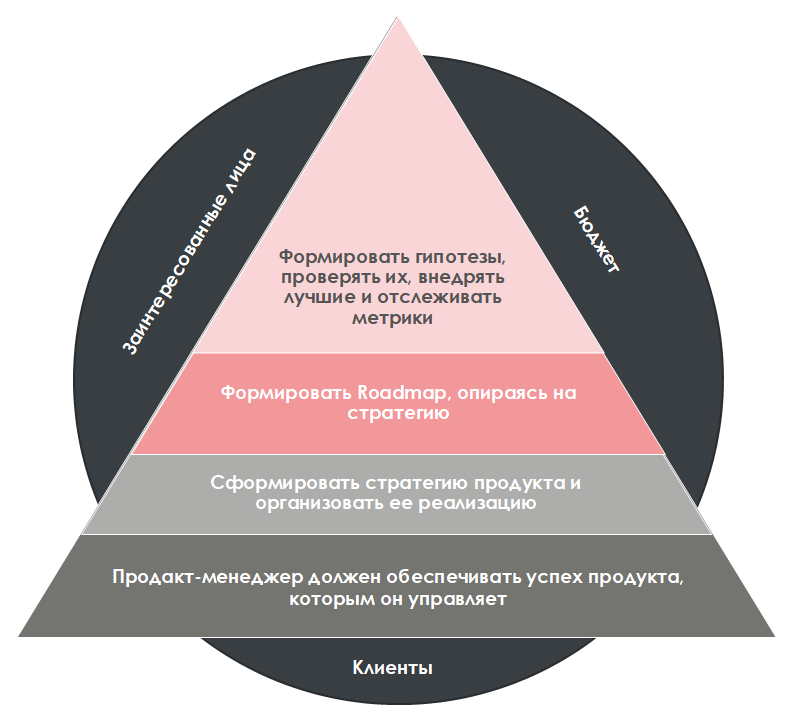
To do this, he forms a product strategy and begins to implement it together with his team. He lays out the strategy into tactics, an action plan (road map) and backlogs (task queue). Then it prioritizes backlogs, on the basis of an action plan, creates, verifies and takes hypotheses into work, forms a budget, selects and tracks metrics. By the way, in companies whose organizational structure is adapted for the development of digital products, UX-researchers or entire teams can develop and evaluate hypotheses.
Product experts are almost always trying to limit. Manager switching to more urgent tasks; a developer requiring clear and understandable descriptions with deep detail; the mass of business customers and partners who have their own vision of products and who want to bring something of their own.
The product specialist and the team must clearly understand the goals and objectives that are solved with the new product. At the same time, management always wants to make the product cheaper and faster to bring to the market, or refine an existing product. The goal of a good product is to balance the interests of the user and the work of the business model embedded in the product from a budget point of view.
Prospects for Product Manager Growth
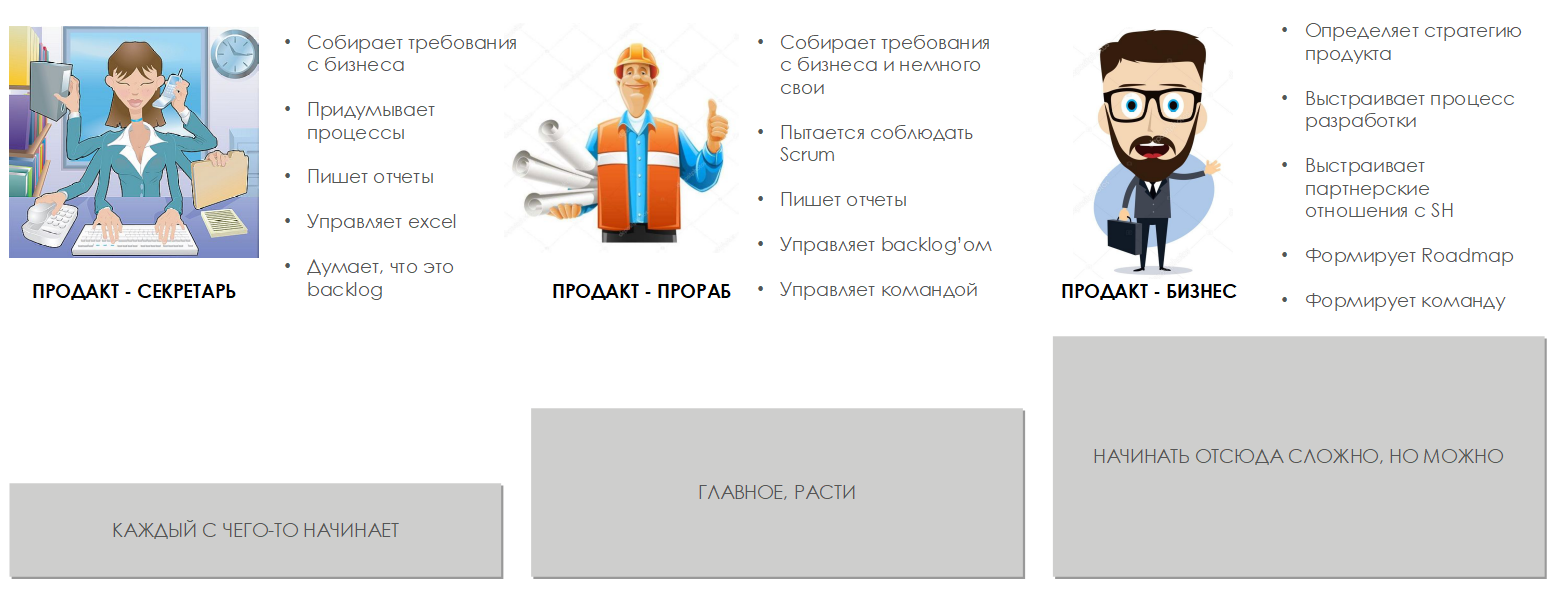
It is easier to become an excellent product, to grow and develop from the position of a product secretary. Of course, there are vacancies in the market for “product business,” and they are the most interesting! - however, starting from this position is difficult. Do not be afraid if you are offered the position of a product secretary at an early stage: “Here you have a small product and a bunch of customers, go ahead and prioritize”. Everything is in order, you just embarked on this path, learn, gain experience. The main thing is to develop, to look for new options for applying the knowledge that you receive about your product and about strangers. There is always a mass of hidden problems and opportunities for their solution and self-development.
Core competencies of the product specialist
In order to grow from a product secretary to a product business over time, it is necessary to develop a number of competencies. They consist of motivation, attitudes, experience and values.
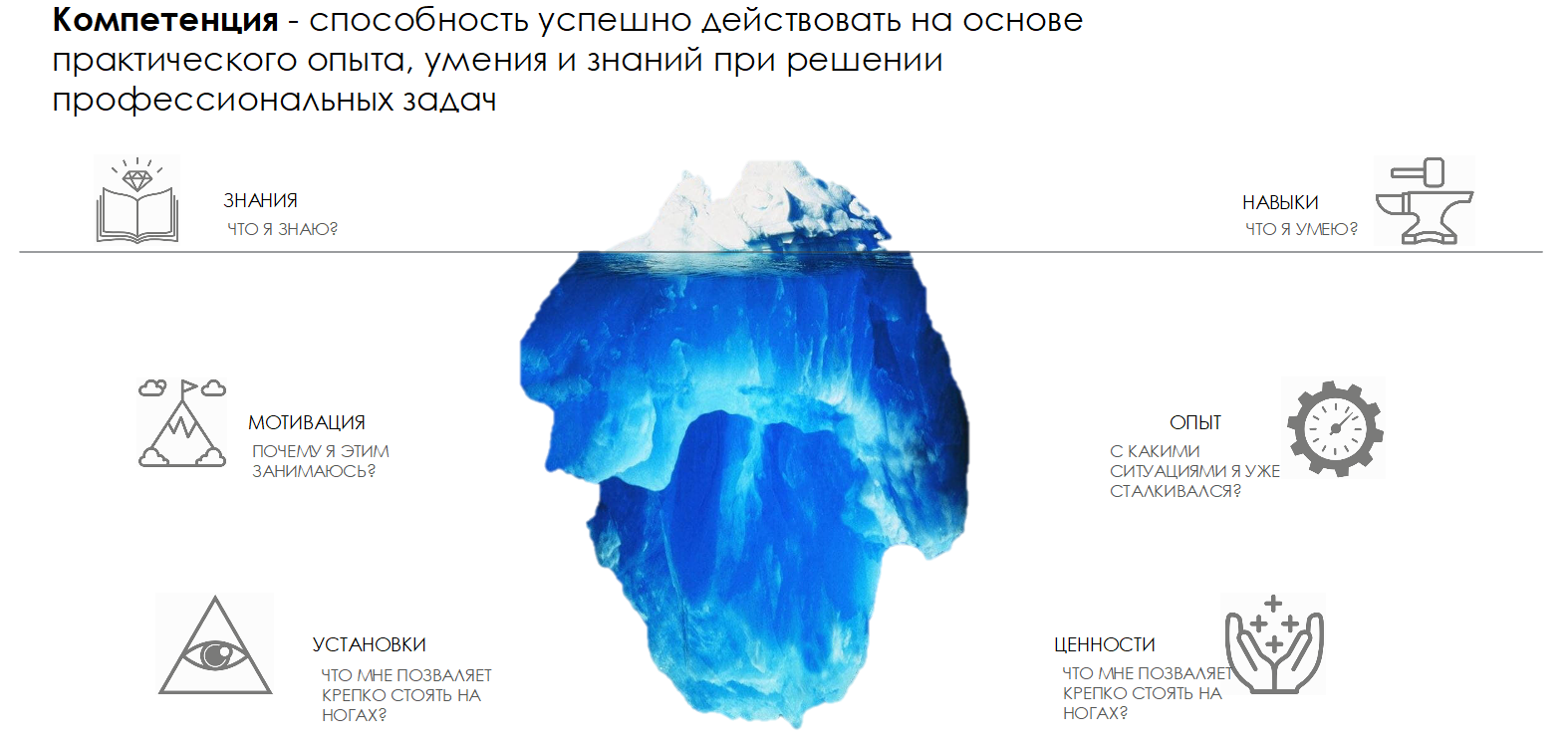
The main components of our competencies:
Motivation - why am I doing this?
Attitudes and values - what allows me to stand firmly on my feet?
Experience - what situations have I already encountered?
Competencies are divided into two categories: personal (soft skills) and professional (hard skills). The former are universal, not amenable to quantitative measurement and are applicable in any professions. Personal competencies include such social, intellectual and volitional competencies as sociability, teamwork, ingenuity, punctuality, poise.
Professional competencies can be taught, and the quality of training can be checked using the exam. For example, typing on a computer, driving a car, reading, mathematics, knowledge of a foreign language, using computer programs. It is important for a product specialist to have the following set of professional competencies:
| Section
| Skill
|
|---|---|
| STRATEGY
| Target Audience Analysis
Company Context Analysis Market analysis: opportunities, threats, competitive analysis, entry / exit barriers Trend analysis Strategic vision of product development (5p, 5s, 5c ...) |
| ECONOMICS AND FINANCE
| Unit Economics
Business cases Mathematical models Macroeconomics Microeconomics Metrics |
| ANALYSIS
| Customer development
Central Asia and its needs Market |
| RESEARCH
| Quantitative and qualitative research
In-depth interviews A / B tests Cjm Jtbd Usability Eye tracking |
| TECHNICS
| Architecture
Product Technical Structure Delivery Methods Delivery processes SQL / Python |
| DESIGN
| Product Design Principles
CX / UX / UI Ui kit Scripts and Flow Design tools |
| DEVELOPMENT PROCESS
| Lean, Scrum, Kanban
CI / CD Analytics processes Development processes Testing Processes Assembly and Delivery Processes |
I will briefly go through the categories of professional competencies.
Any product is a good strategist. For a product to be successful, you need the right strategy and accurate analysis.
Study your company and evaluate its movement vector. Any product is part of the company. It is necessary to create or develop it taking into account its interests and the direction of development.
The product manager must also have an assessment of the financial model. To be able to consider unit economics, build business scenarios, create mathematical models. Without all these tools, you will never be able to understand what place your product will occupy in the market.
The product must be well versed in the technologies used to create the product, as well as in itself. When communicating with developers, you need to speak the same language with them.
It will help the product technologist and knowledge of design. A product creating software will need knowledge of computer graphics technologies, the basics of building a GUI and its scripts. After all, when developing software, he will contact programmers, artists, GUI designers and other specialists, checking and controlling their work.
And now a few words about personal competencies.
Critical thinking is very important. In work, quite often you have to deal with a large amount of information from all participants in the business process: colleagues, users, business customers. And critical thinking will help to isolate the essence of a huge amount of information. When a product manager generates features, there is always the temptation to first implement the functionality that, in his opinion, the user needs more. But you must remember: “I am not my target audience. I am not representative. ” Therefore, it is always important to include critical thinking in relation to yourself and to business partners.
The product manager must be sociable. He is always surrounded by many people - customers, team, partners, project managers and others. And with them it is necessary to build business relations. If you don’t like people, don’t think about a person, you don’t have empathy, then you cannot make a good product for people.
A good product must be an innovator. He needs to constantly keep his finger on the pulse and monitor current trends. Systemic thinking, self-organization, flexibility - these qualities are vital for the product specialist.
However, do not think that the product specialist should be a kind of know-it-all and specialist in all areas. Its task is not to replace all specialists by itself, but to control their work, jointly solving problems that arise. And without the presence of basic competencies in these areas, you just can not do.
How to develop?
There are different ways to develop in yourself those competencies that are weak or lacking in you: solving work tasks, courses, internships, with the help of a mentor, etc. I recommend googling on request “mind map learning methods”. Here is one of many examples:
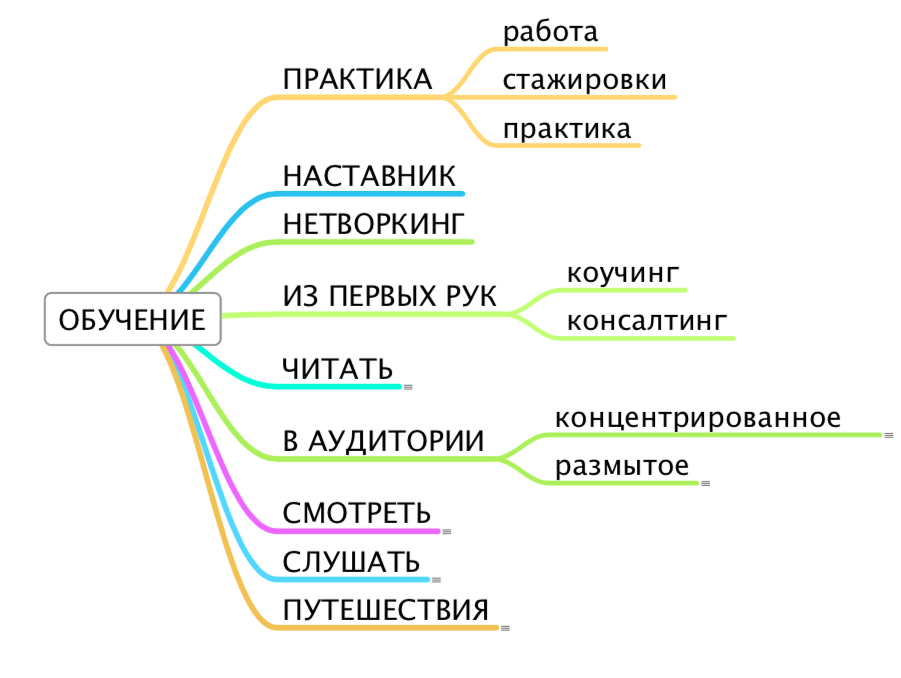
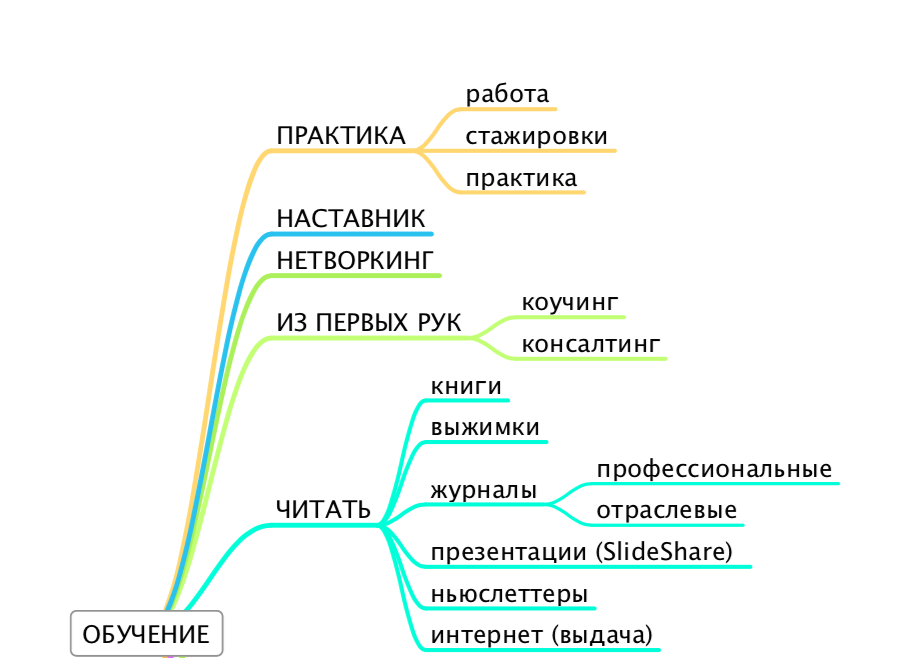
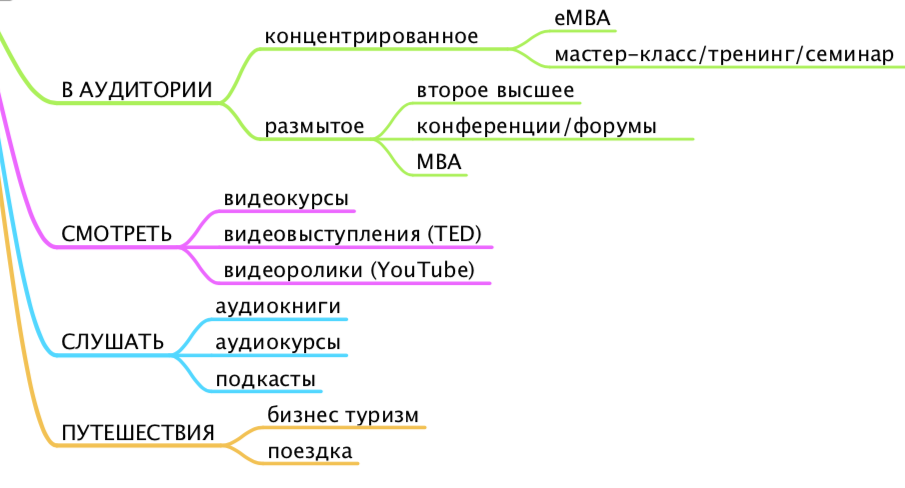
Constant growth
The profession of a product manager is continuous growth and movement! The product specialist cannot stop developing, otherwise he will not create the products the consumer needs. He needs to keep himself in technological tone.
To do this, you can use the same tools that are used when creating a new product. Make an action plan for yourself, objectively evaluating your capabilities and competencies. Sort skills and knowledge by level of importance. Identify areas where you need to pull knowledge and skills forward.
Create a similar plan for each team member and evaluate their capabilities. Highlight their key skills, competencies, and determine their level. Remember - you have a team, and you must definitely become a successful leader in it and lead it along!
Where and what to learn from the product specialist
Courses:
- Product school M.Video Eldorado
- HSE: Product Management
- Netology: Product Management
- SkillBox: Product Management
- Goractice
- British school of design
Books:
- Shipping greatness, Chris Vander Mey
- "Crossing the chasm" / "Overcoming the abyss", Jeffrey Moore
- Inspired by Marty Cagan
- “A mental hospital in the hands of patients”, Alan Cooper
- “Communicate with the child. How? ”, Julia Gippenreiter
- "Infectious", Jona Berger
- "About the interface" Alan Cooper
- Hooked / Buyer on the Hook, Nir Eyal
- Lean Analytics, Alistair Croll
- Scrum by Jeff Sutherland
- The Mom Test / Ask Mom Rob Fitzpatrick
- All Intercom books, in particular, Intercom on Product Management
- Growth hacks, Aladdin Happy
- “Agile Product Management with Scrum: Creating Products that Customers Love”
- Delivering Happiness: A Path to Profits, Passion, and Purpose / Delivering Happiness, Tony Hsieh
- Lean Analytics, Alistair Croll
- “Thinking, Fast and Slow” / “Think slowly, decide fast”, Daniel Kahneman
Telegram channels:
- Babaev, to the board!
- NewGamePlus - Product Management, Entrepreneurship and Self-Development
- How I Met Your Product
- Do it ok, it will be ok
- Dumik - Entrepreneurship, Products and Life
- Product Beard
- Flat White Digest
- Threshold of Chaos: Systems and Products
- Venture adventure
- Products, books and love
- Pavlo is on the road
- Keep it simple, stupid!
- Qetzal-1UP channel
- Product management
- Analysis paradisis
- Fedor Borshev
- Pov
- PM Life
- Alexcouncil
- Productology